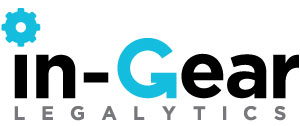The In-Gear Legalytics Manifesto on Legal Technology
Technology applied to the delivery of legal services may have the strongest potential for transforming the legal profession.
But is also one of the most misunderstood and misapplied tools in a practitioner’s toolkit.
The words “legal technology” can be a reflective prism, only revealing the thoughts of the speaker and not holding any meaning themselves. Legal technology runs the spectrum of applications from tools to make basic tasks easier (email, word processing); to tools specific to the practice of law (timekeeping systems, project management tools, contract management systems, IP management systems, e-discovery); to tools customized for the management of legal departments (enterprise legal management; knowledge management and document management systems). On top of that, there are voices that have sounded the clarion call warning that emerging technology will one day replace lawyers (not likely in our view).
- We believe that technology can be deployed to handle high-volume, low risk legal matters through self service tools that can bring in a skilled human when faced with issues that are beyond the design of the tool.
- We believe that technology is a tool, and is most useful when deployed by a human who is skilled in the art of using the tool. This is why data leads to better decision making, but cannot replace judgment.
- We believe that technology should support a process, but technology cannot provide an aligned process where one did not previously exist. New software alone will not cause people to change the way they work.
- We believe that technology enables us to pull together more data, and increasingly disparate data, to generate connections and enable visibility that was previously impossible to achieve. This, in turn, is allowing leading firms and corporations to identify opportunities and quantify risks in unprecedented ways.
- We believe that data will continue to grow exponentially (particularly as more people and tangible objects become connected to the internet and interact more frequently) which means it is critical to understand both what is excluded and included from your data sets in order to properly mine your data for actionable intelligence.
In-Gear Legalytics has experience in:
- Identifying opportunities for technology to improve the legal value chain.
- Evaluating and selecting technology vendors.
- Both customizing and configuring enterprise legal technology products to seamlessly integrate into pre-existing organizational procedures.
- Working with in-house and law firm IT departments to develop and deploy proprietary technology tools.
- Creating taxonomies and information architectures to apply structure to previously unstructured data.
We offer consulting services to all players in legal technology.
- We evaluate existing technology products and design custom tools for law firms and law departments that meet client needs and achieve process and productivity goals.
- We understand how to liaise among law, IT, and vendors to complete a project on time and on budget.
- We assist entrepreneurs in designing new legal technology tools by leveraging our experience working in law firms and in-house legal departments. We understand how law works.
- We advise investors in evaluating opportunities by leveraging our experience as purchasers and implementation champions of legal technology. We understand why legal tech is bought, what makes it sticky, and why an application gets replaced by new tools.
- We collaborate with academics to bridge the gap between law schools and computer science departments in order to develop novel learning experiences, generate the tools of the future and find ways for students and junior lawyers to acquire practical experience in a market that avoids reinventing the wheel.
We are well versed in the emerging and rapidly developing areas of predictive coding, language based analytics, the internet of things, expert systems in law and the use of Watson (artificial intelligence) in legal services. We are actively seeking partnerships with developers, coders, academics and entrepreneurs interested in further developments in these areas.
